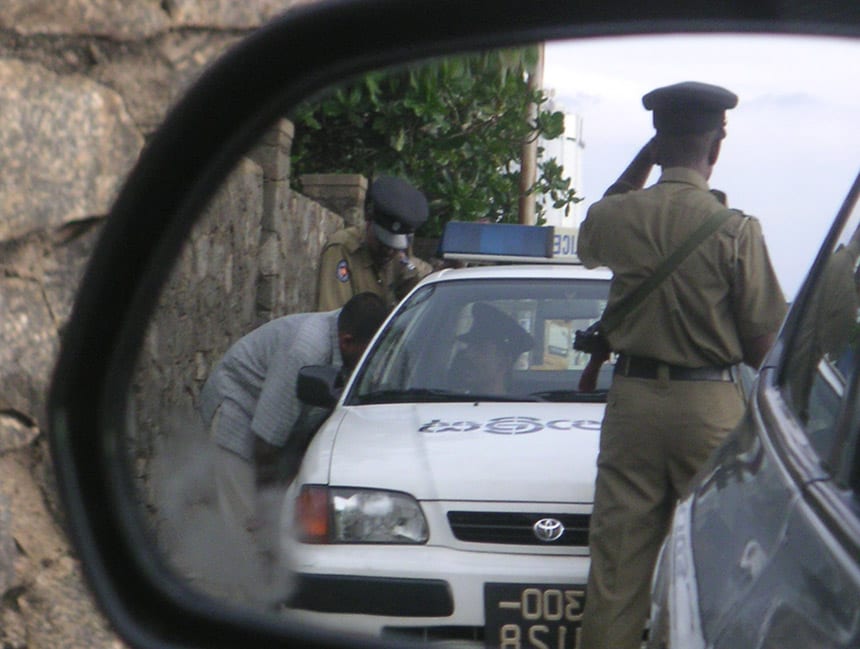
By Sarah Weld
Earlier this month, the International Human Rights Law Clinic joined efforts with the organization REDRESS to file a complaint with the United Nations Human Rights Committee on behalf of a British citizen who was abducted, detained, and tortured by Sri Lankan officials when he visited Sri Lanka in 2016.
Velauthapillai Renukaruban (“Renu”), an ethnic Tamil, fled the country in 2001 at age 19 during the civil war between Sri Lanka’s government and the Liberation Tigers of Tamil Eelam. In 2016, he returned to visit his elderly mother and get married.
Within 24 hours, Renu was abducted from his mother’s home and taken to a secret facility, where he was severely beaten and interrogated about his alleged ties to the Tigers, which he denied. When he refused to confess, the officials threatened to kill him. He was then sent to prison, where he was heavily beaten by guards, leaving him badly injured and unconscious.
With the help of a lawyer hired by his family, Renu obtained bail. His case was dismissed after the police failed to present any evidence. The judge, however, advised Renu to go into hiding to prevent another police detention.
Now living in the United Kingdom, Renu, whose beating and torture left him with a brain injury and post-traumatic stress disorder, is seeking justice from the U.N. for his suffering in Sri Lanka.
Pattern of torture
Three students, Malka Herman ’20, Simone Lieban Levine ’21, and Edward Richter ’20, researched and drafted the complaint last fall, supervised by Clinic Director Laurel E. Fletcher and Teaching Fellow Tamara Morgenthau.

“Renu’s case fits an appalling pattern of torture against Tamil men. A ruling by the U.N. Human Rights Committee that Sri Lanka committed torture elevates this targeted persecution as an international concern,” Fletcher says. “The treaty bodies have an obligation to render a judgment and to hold Sri Lanka in violation of its human rights obligations. The value is in letting the government know the world is watching and providing Renu a measure of justice. These are serious violations and we want the government to address our allegations and to respond.”
Since his return to the U.K. in July 2016, Renu has suffered from ongoing physical and mental ill-health as a result of the torture he suffered, leaving him unable to work. He was separated from his wife for an extended period due to visa issues and, afraid for his safety, he can no longer return to Sri Lanka to see his mother.
The Sri Lankan police have failed to investigate Renu’s torture claim and the Sri Lankan Human Rights Commission has not taken any documented action on his 2016 complaint. This fits within the country’s well-documented history of impunity for torture and other human rights violations, say REDRESS staff and clinic faculty.
“This case is important for Renu as an individual survivor of torture to get the justice and accountability he deserves. And we hope the Human Rights Committee calls on Sri Lanka to take broader measures that will bring accountability for other survivors and be a step towards ending the culture of impunity in Sri Lanka,” Morgenthau says.
Combining truth and advocacy

The students researched international law and treaties, combed through Renu’s medical records and his attempts to get justice in Sri Lanka, and wrote the 50-page complaint. At one point, the team gathered to participate in one of REDRESS’s interviews with Renu by phone.
“It was incredibly meaningful to us, especially hearing about his experiences firsthand,” says Levine, who recommends that every law student participate in a clinic and describes it as an important collaborative experience. “There is something so meaningful in helping people you’ve never met and have no obligation towards other than that they are also human beings.”
Richter also appreciated the collaborative nature of clinic work and said he was most surprised by the “complete lack of a formal enforcement for violations.”

Herman, an experienced writer, found her work alongside REDRESS in preparing a revised witness statement in Renu’s own words particularly challenging.
“My creative writing background did not prepare me for this assignment because Renu’s experiences were nothing like the stories I wrote before law school. Renu is not a character. His experiences are not metaphors or devices to move a plot along. I cannot give him a happy ending,” she says. “Working on this complaint taught me that I do not want to be the kind of lawyer who compromises on the truth in order to win. It is only through wrestling with the hardship that clients have lived through that I can be thoughtful in how I portray the stories of others.”
The team worked closely with Renu’s legal representatives at REDRESS, which works from London and The Hague to seek justice for torture survivors and to combat impunity for governments and individuals who perpetrate torture.

“The team at Berkeley has shown great commitment to the task, and their hard work has been instrumental in us being able to make this important submission on behalf of our client,” says Chris Esdaile, legal advisor at REDRESS. “Despite promises from the Sri Lankan government to the U.N. Human Rights Council in 2015 that it would uphold human rights and promote accountability, this case, relating to torture which took place in 2016, is one of many which suggest that Sri Lanka did not abide by its promises.”
The complaint asks the Human Rights Committee to award Renu not only compensation for the harm he has suffered and the costs for his medical rehabilitation, but also requests a public apology by Sri Lanka and an independent criminal investigation of the events. It also calls for preventing similar violations in the future, including establishing an independent judicial mechanism, closing down unofficial detention centers, introducing an effective torture prevention program, and reforming the justice sector.
Further information about the case can be found on REDRESS’s website here.